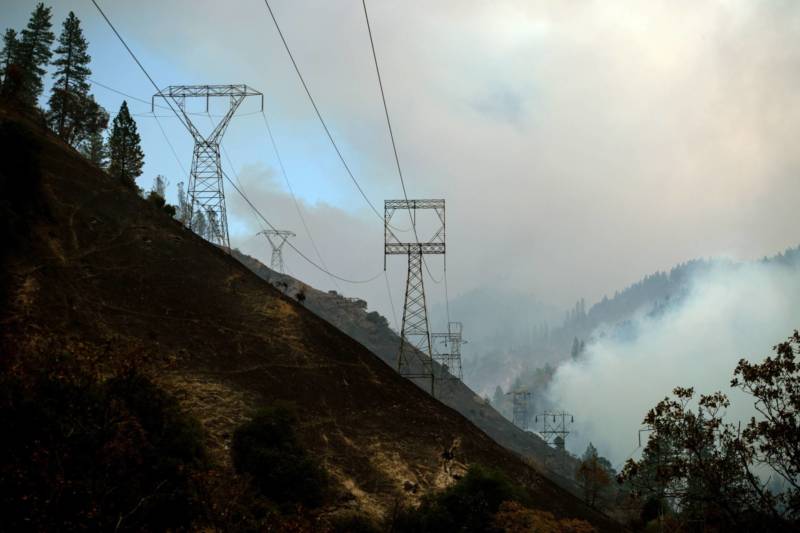He said potential offenses could include violations of Sections 4292 and 4293 of the state’s Public Resources Code, which regulate clearance distances between power lines and surrounding vegetation, up to reckless arson and involuntary manslaughter.
PG&E has acknowledged that it’s “probable” investigators will determine its equipment started the fire, which killed 85 people and burned nearly 14,000 homes in and around the town of Paradise.
The blaze’s horrendous toll triggered a flood of lawsuits against the utility and added to the tidal wave of potential civil liability it faces. The company cited the wildfire liabilities, which also included possible damages arising from a series of devastating incidents in October 2017, when it sought Chapter 11 bankruptcy protection earlier this year.
Lawyers for one group of wildfire plaintiffs — insurance companies whose policyholders suffered billions of dollars in losses in the Camp Fire — asked U.S. Bankruptcy Court Judge Dennis Montali on Wednesday to issue an order barring Butte County investigators from sending their fire evidence to the FBI Laboratory in Quantico, Virginia.
The plaintiffs’ lawyers said in their filing they had learned only Monday from attorneys for PG&E that the DA’s office had worked with the utility to remove portions of transmission towers near where the fire started, that it planned to ship the transmission tower hardware to Virginia and that the shipment was scheduled for as early as Wednesday.
The filing argued that Butte County’s plan, which involved testing that could destroy some of the transmission tower hardware, would deny plaintiffs the opportunity to independently inspect and assess the evidence for future civil cases.
After listening to half an hour of arguments from attorneys for the plaintiffs, PG&E and the state attorney general — the last of whom argued that granting the order would unduly interfere with a criminal investigation — Judge Montali said he’d let Butte County proceed with its plan to ship the material to the FBI.
Montali said he didn’t believe the testing would materially affect civil plaintiffs’ cases. The bottom line, he said: “I can’t run the risk today of disrupting a criminal prosecution.”
Cal Fire spokesman Capt. Scott McLean said Wednesday he’s not aware of other instances in which prosecutors have launched a criminal probe while the firefighting agency’s cause investigation is ongoing.
Typically, Cal Fire forwards investigations that have found possible criminal infractions to county DAs, who conduct further inquiries and decide whether to file charges.
An earlier criminal investigation by Butte County, which focused on a 150-acre fire near Paradise that occurred in October 2017 and was referred for follow-up by Cal Fire, ended with PG&E cutting a deal that allowed it to avoid prosecution.
But the $1.5 million settlement also resulted in a federal court ruling that the utility had violated terms of probation in another case. In that matter, a jury in San Francisco convicted the company of breaking pipeline safety laws and attempting to obstruct a federal investigation into the 2010 San Bruno disaster.
U.S. District Court Judge William Alsup, who is overseeing PG&E’s probation, has been harshly critical of the company’s safety record and launched his own inquiry late last year into the company’s role in starting recent wildfires. As part of that inquiry, he asked the state attorney general’s office last December to weigh in on the company’s potential criminal liability for fires it may have started.
Alsup said he wanted to know “the extent to which, if at all, the reckless operation or maintenance of PG&E power lines would constitute a crime under California law.”
The attorney general’s office replied that PG&E’s criminal liability would depend on just how reckless the company was found to be. If the company’s operations, maintenance or safety practices were shown to be so deficient that the company was acting in disregard for human life, the AG’s office said, it could face murder charges.
